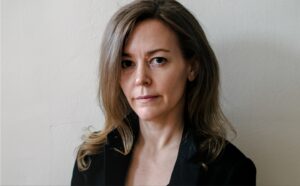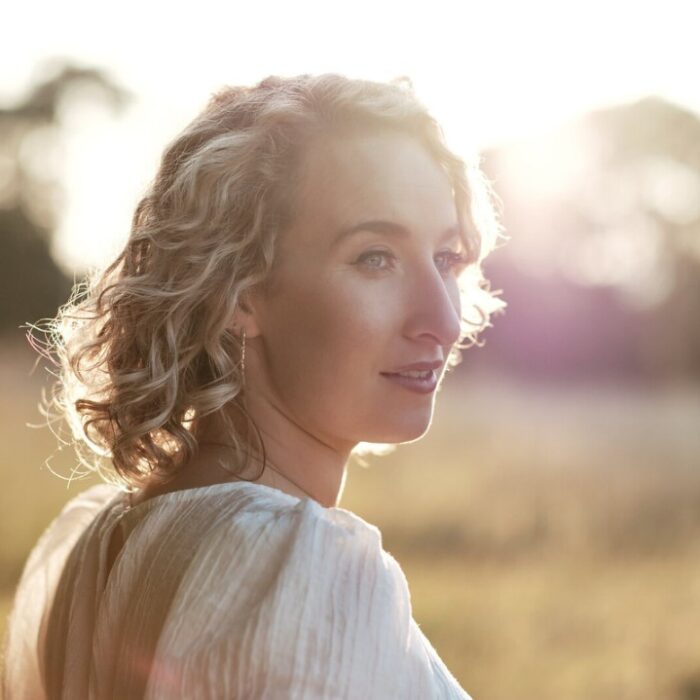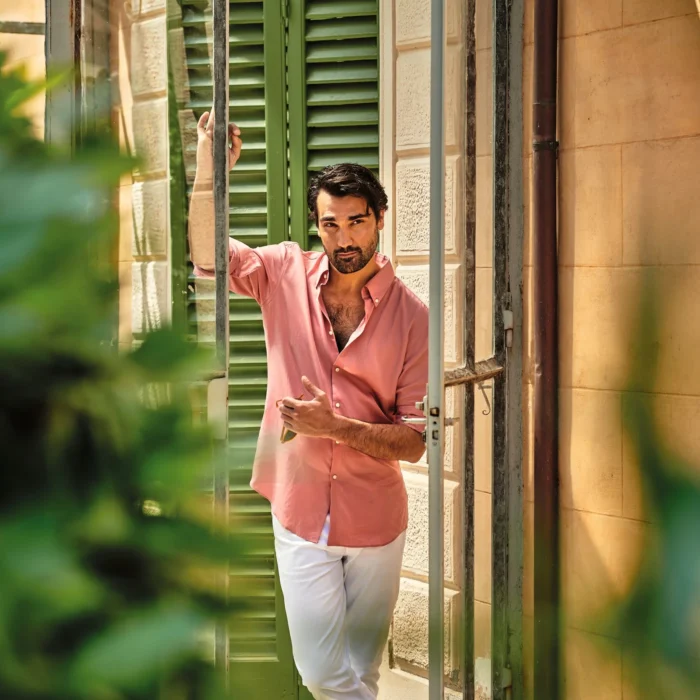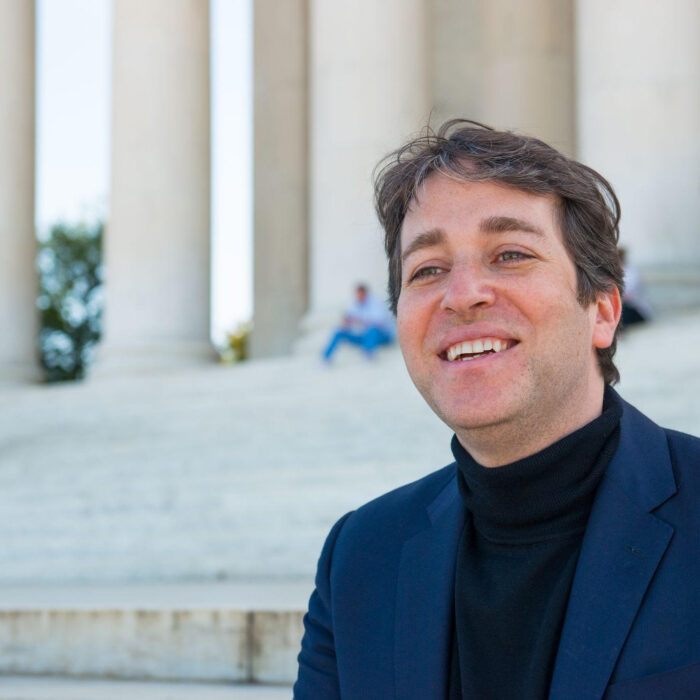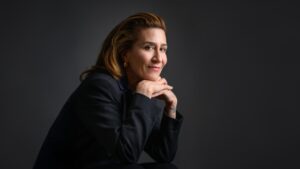
Q & A: Composer Jeanine Tesori, Lincoln Center’s Visionary Artist 2025, on Her New Opera ‘Blue’ & Her Experiences as a Composer Writing Across Genres
By Jennifer Pyron(Photo: Nina Wurtzel-Horiz)
Jeanine Tesori is one of today’s pioneering composers. Her work transcends boundaries and spans genres, including film and opera. Her new opera, “Blue,” which received the MCANA Award for Best New Opera, and “Grounded,” the first female commissioned opera by The Metropolitan Opera, are making history. Her work focuses on political and societal complexities, woven into the tapestry of the human experience, without holding back on how these stories impact our environment on a larger scale.
Tesori is a two-time Tony Award winner and this year’s Lincoln Center Visionary Artist, with upcoming community events, concerts, and panels that showcase her work and detail how she has paved a career path that is uniquely her own. Program highlights include her new opera “Blue,” presented in collaboration with Lincoln Center Theater and Metropolitan Opera on Saturday, November 15, 2025 at Wu Tsai Theater (David Geffen Hall). The staged concert will feature performances by Tamar Greene as The Father, Tamara Jade as The Mother, Phillip Boykin as The Reverend, Shereen Pimentel as Girlfriend/Nurse/Congregant, Ramona Keller as Girlfriend/Congregant, Darius de Haas as Policeman/Congregant, Mason Reeves as The Son, Crystal Monee Hall as Girlfriend/Congregant, and Jared Wayne Gladly as Policeman/Congregant.
On March 20, 2026, she will also present her musical theater work, “Violet,” performed in American Sign Language by Deaf Broadway, which will be followed by community events that nurture creativity and connectivity, and a film screening of “West Side Story” in collaboration with Film at Lincoln Center.
In an interview, OperaWire learns more about Tesori’s creative process and what it takes to be a leading composer in today’s world.
OperaWire: Congratulations on being Lincoln Center’s 2025 Visionary Artist. How do you see this opportunity as a bridge to connect audiences and artists in today’s world?
Jeanine Tesori: I think about this year a lot and how to convey my thoughts — especially with my students. This year has been a big year. I’ve taught at Yale University for over a decade and just this year I was officially appointed to a full professorship. [With my work,] it is about where there might be a linkage and how to move forward in that direction. For example, I would like to do something at Juilliard that celebrates my precious writing partner, David Lindsay-Abaire, [who now teaches at Playwrights and] whose mentor was Chris Durang. He and I wrote two musicals, and we’re writing a third together. Let’s look at the linkage there and, through this visionary artist, plant myself there.
We’re doing “Blue” with different singers, amplified with a reduced orchestration. So it’s a theatrical concert with people who also sing for funk bands and at church and in opera, to sort of connect them in this world. And so it was this opportunity, for an institution to say to me “what would you like to do here? And who would you like to do it for?” There’s a panel on reimagining justice with Bryonn Bain, who’s a fantastic hip hop artist that we’re live streaming to the prison community. And my friend, Professor Susan Sturm, who’s a law professor at Columbia, is coming to sign her books. And we’re singing “Blue” there.
And so my mind swirls a lot with ideas, and it doesn’t always have a place for the ideas to land. So that’s what Shanta Thake did. She invited me to make all these connections, and it comes down to when the philosophy is sound, the procedure becomes clearer. So when we did a concert, a relaxed performance at Geffen Hall this past Sunday, we did a lot of call and response. And one of the things that we did was partially sing the rules of engagement that we were using with the ASL community and… we welcomed the young people to walk around, to leave if they needed to, to wave on. So we sang that back and forth, and it not only spoke to them, I realized: “oh, that’s a really helpful tool.” I heard from a lot of parents that that connection of rules that are usually spoken was received by the children in a different way because it was sung to them and celebrated as opposed to an admonishment. And so I’m also learning as I go about what works. [Sometimes, maybe, it doesn’t] work at all. And [I’m] trying to be, you know, as brave as I can, to honestly make some connections in this program.
OW: How have you paved your career path as a female composer whose work pushes boundaries across genres? What are some takeaways you’d like to share?
JT: That’s a great question. My three sisters and I were raised by a very, very, strict, tough, and demanding father. And in some ways, you know, one of the things he said to me was, “I have to be incredibly hard on you because the world is going to be harder.” And he was right. I think that I have found so many men who have championed my work, including my mentor, Buryl Red — I will always say his name. Also, Linda Twine. And I’ve looked to other women including Deidre Murray, Tania León, Liz Swados, Micki Grant. There are so many… But I have always felt that there is a pause of, “is she going to be able to ‘fill in the blank,’ orchestrate for a large orchestra, or do something that has been historically filled by men?” Usually, you know, it’s in that sweet five- to ten-minute meeting that I usually feel [the need to defend myself]. [But,] as I’ve aged, I don’t feel that way as much. I just feel like I am who I am and I try to lead with rigor and as much… kindness as is welcome. It doesn’t mean weakness, but I think it’s the courage to live inside my own values. And also when I mess up, which is very often, to really be as critical of myself as I am in the systems that I’m in. How can I do better? How can I be of service? How can I be useful? How can I be healthier in my brain that celebrates perfectionism and bemoans wrinkles and doesn’t really value an aging woman as it does an aging man? So all of these things which require a sort of humility, but also having the shingles on the roof really nailed on tightly so that you stay sane and joyful and curious.
OW: What motivates you most when you compose? What is your creative process like?
JT: Such a good question. I just came out of a rehearsal for “Blue.” I was coaching the gentleman who’s playing the father and revisiting the score. I haven’t played that music in so long and I could never write it that way now. I was in a certain place and I remember being in that flow so deeply when writing it. It’s very angular. It’s so difficult to sing. And I didn’t realize until I was the one sight reading the music and I was like, “whoa, this is hard!”
I came to music very early and very late. I started playing at three, I started studying at five, and then I left at 14 because the classical world didn’t feel welcoming to me. And so I went over to pop music and then I came back to classical music when I was 17 and I studied. I started the music program at Columbia. I was a music major at Barnard, but did the program at Columbia. I fell in love with it because it had been absent and I found my own way back… The composers who I really loved [were] not the romantic composers. Well, I like them very much, but I don’t love them. Then there were composers that I really felt pulled towards and that was an incredible feeling. That rediscovery of it made me feel like, “oh, I’m rediscovering something that I already knew, but not in the way that I want to know it now.”
Also as a scientist, because I had studied science, I came back to music through science. And so there is that part of [me that asks,] “how is this put together?” If you take the back of the watch off, how do you put it back together so that it still works and you still marvel at the way that it tells the time? I love doing that. However, I always feel behind. I always have this “I must learn” [feeling.] There is so much to learn, [there is a] kind of pressure in that way. Everything I write is something I feel like I need to study or learn. [Whether] it’s about another person, a character, a way that an orchestra or band works, working with a director I’ve never worked with, or a kind of [different] world, I want to understand how I can hear it. So it’s fascinating… Honestly, it’s like being in a perpetual universe. It’s the You-University, I guess.
OW: And which classical music composers specifically pulled you back in for your rediscovery?
JT: Bartók, for sure. Stravinsky, Kabalevsky. Those three, for me, were really important because of their vibrancy. They were alive in a different way. Their expression just goes straight in, unfiltered. And it’s probably because I had played so much romantic music as a pianist in serious study, and this was just a different world for my ears.
OW: What did it feel like when you found out you would be the first commissioned female composer for the Met?
JT: You know, it’s a hard question, because I have a trans child and the thing that I’ve learned from them is to look at the world in a more fluid way and to not get stuck. It’s really about the essence of who people are, not the identity as much. Identity is incredibly important, but at the end of the day the essence is who we truly are authentically. And so I’ve never really thought as much about gender because I’ve been doing this for such a long time. And I was raised in a strong way, almost like a young man, by my dad. And so, I do appreciate being [first,] if there is a first… You know, I’m very proud of it — [but] at the same time, it’s not really the way I think.
OW: Thank you for being honest and answering with transparency. And also, congratulations on releasing the world premiere recording of “Grounded” at the Met last month. How was your experience during the preparations for this work? Were there any challenges you had to overcome along the way?
JT: “Grounded” is the largest piece I’ve ever orchestrated. I was very mindful at carving out a space for the voice so that Yannick’s left hand didn’t have to constantly be down on the orchestra. And that kind of setting for unamplified voices is really, really challenging… But my discovery of working with Emily D’Angelo is one of the- I can’t say enough about this young singer. She became a partner, and I didn’t write a note before I met her. And even just from talking to her, I thought, this is the kind of person who just jumps in. She’s very fun to work with. It took her a little while to be able to say, “I’m questioning this section right here,” because she’s so respectful. And finally I said, “you know, I can see you’re thinking something about this part here, or this note.” I learned so much about the voice from being in partnership with her. It reminds me of the way that, you know, the Ravel harp part, when he orchestrated Mussorgsky, you just knew that he was friends with the harpist. It was just beautiful the way that he orchestrated for the identity of these voices. And for me, I wanted to be with Emily. First of all, I didn’t want to strip her voice, and I wanted her to be able to go out after she sang. And so I keep learning about the way that the voice is. The voice is so astonishing to me. I will never sing in public. Well, I will maybe do karaoke, but that’s it. Because I don’t know anything more vulnerable [and scary] than that… And she makes it look like she could also ice skate and do a triple lutz at the same time. I don’t get it. Opera singers, to me, are the NFL. They are superhuman. I love them so much. I love opera singers and musical theater singers, but they’re amplified. Some opera singers are amplified, but the way their voice is so powerful, it is really something.
OW: Tell me all about “Blue” and how you developed it from the beginning. What message do you hope to share through this work?
JT: “Blue” was commissioned by Francesca Zambello. Her and Peter Gelb are responsible for my being able to be in the opera world. And she contacted me after I did an opera with Tony Kushner and Philip Glass. She said, “we would like to commission you, it’s a composer’s commission. We want it to be a political opera. I think it should be an opera about race and racial injustice.” And then I saw Philip Glass’ opera, “Appomattox,” that night. It was directed by Tazewell Thompson, and it was directed on the head of a pin. It was so fragile and confident. And I thought, “who is this director?” And it turned out that Tazewell was also — and is — a beautiful playwright and librettist. And we met. We just hit it off and then started talking about life and Tazewell’s life as an African American man in New York City. And a lot of “Blue” comes out of his lived experience. He’s all throughout this opera. Tazewell is a poet, but also he understands dramatic structure. And we wanted to look at it as an almost [Classical] Greek structure. Three men, three women. There are archetypes: the father, the mother, the son. And [we wanted to ask:] if the fates of a black man in America are decided like the Greek fates, where do they cut the thread? Has that been already decided, in some ways, in this climate, in this country? But [we also wanted] to balance it with the joy of family. What has been denied is to see a loving family intact, and [we] really emphasize that. So it’s not just taking the incredible tragedy of what happens, but creating the brightness in these characters who love and stay intact and have, you know, what every family has. But the tragedy casts the long shadow.
OW: In this regard, what are you still learning most about today? What keeps you curious about human complexities and our world?
JT: This is a very, very far reaching question because I’m seeing my students, and myself- I think it’s very difficult to walk out the door right now. I think it’s difficult to be a citizen. I think it’s difficult to make sense of something that feels chaotic. And this is going to sound really hokey, and I guess I don’t care: I think that people really need to lead with love and care. I’m all about skill and craft and study and curiosity. But this is a time where [what] I’m trying to do in every class, and in every rehearsal, is remember that it’s real right now. And I think trust is at an all time low. I know when I read something, I think, “okay, maybe.” It’s so difficult to really know that what’s in front of you is what’s in front of you. And that is a first for me, and I’m 63. And this, I think, is a time when the ground under your feet is always moving. So I think what we need to do is to create something that feels solid and held. We need to hold people in this way. That doesn’t mean to be lax or to give up. But I think it’s really about leading with the idea that we tell these things onstage to hopefully bring people closer to whatever is happening in their lives. Otherwise, I don’t know why we do it. And [it’s] also to release them with laughter, or to allow them to either take a break or to lean forward or to feel less alone. But it’s that Brechtian thing that for me: I would like an audience to leave different to when they came in. Sometimes it’s transformation and sometimes it’s just a little bit lighter from having released something they didn’t know that they were holding. It can sound highfalutin, but otherwise, I wouldn’t know what I would be doing this for. And music for me has been in my family from long ago, from Italy. And so I feel like it’s hard to verbalize my own place in it.
OW: What are your plans for your next operas? What do you hope most for this art form?
JT: I’m looking for something for Emily D’Angelo, for sure. I would love to write something for her. I would like to write a smaller piece that a lot of opera houses can do easily. I think, for me, it’s about a mix of theater and opera, whatever that means. And I think it’s dependent on the story that I’m really looking for. I really love what Yuval Sharon has done in Detroit, putting opera in unsuspecting places. I love “The Mother of Us All” from Juilliard. That was done at the Met Museum. Louisa Proske directed it and it has stayed with me, and it was a long time ago… I thought, “that is just stunning — to transform a space like that.” Hannah Moscovitch was the librettist for “I Have No Stories to Tell You,” which I also saw at the Met Museum, [and it] used a sculpture as the set, and that has lasted with me in my memory as well.
